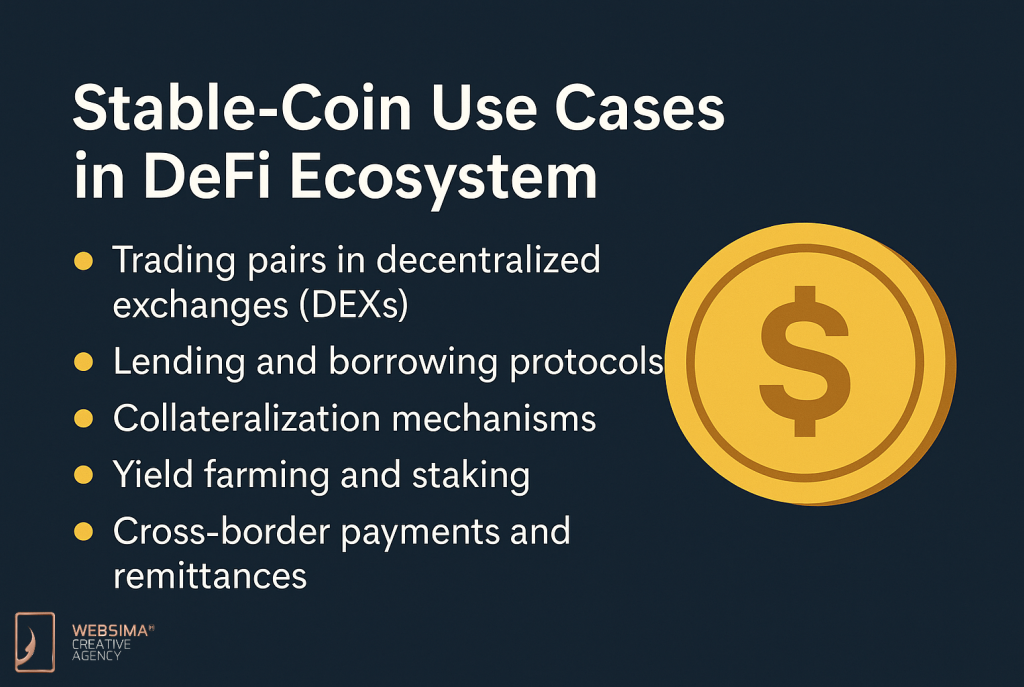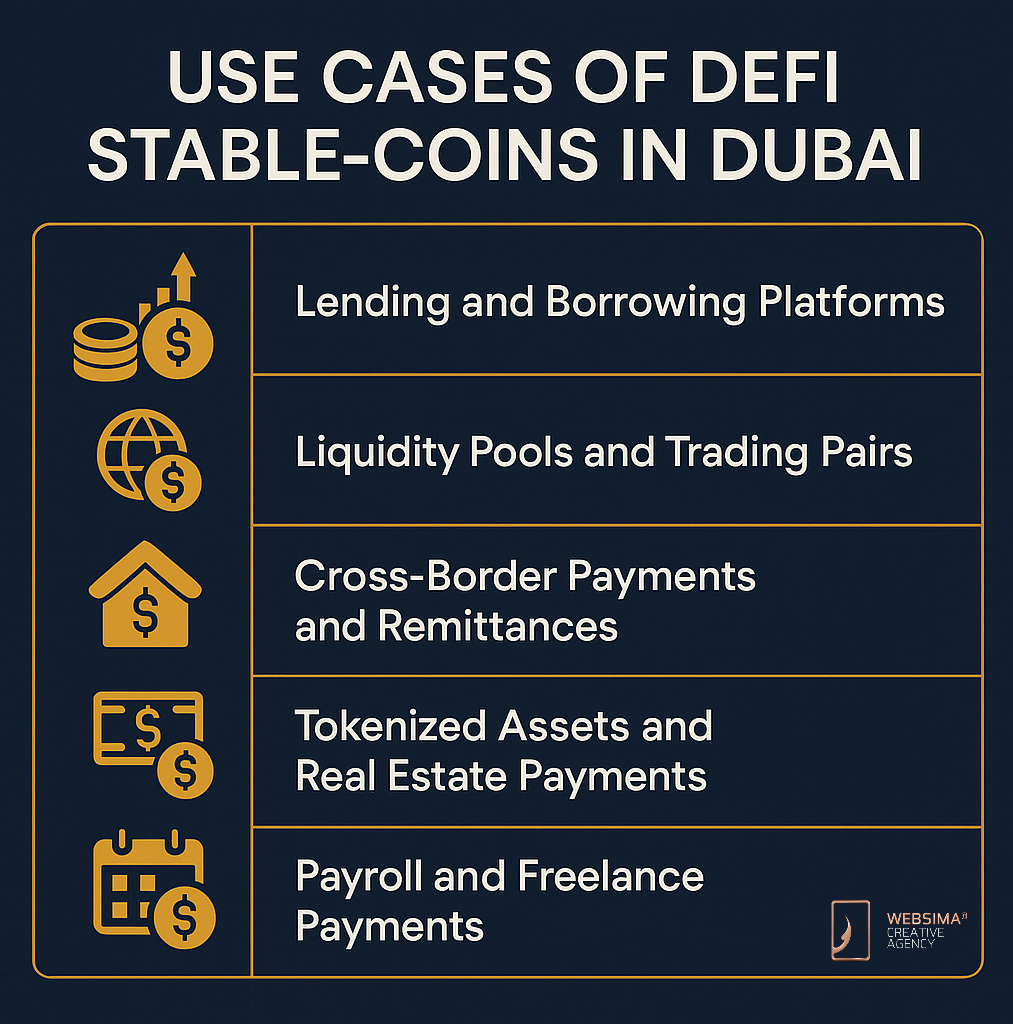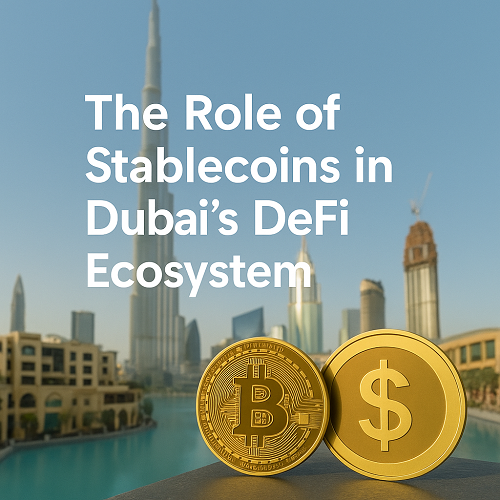Introduction
Dubai has rapidly evolved into a key player in the global blockchain landscape. The emirate’s openness to innovation and regulation has made it an ideal launchpad for Web3 technologies—particularly decentralized finance (DeFi). Within this ecosystem, stablecoins serve as the vital bridge between volatile digital currencies and real-world utility.
In this article, we examine how DeFi stablecoins in Dubai are playing a transformative role across lending, trading, payments, and infrastructure. We’ll also highlight regulatory progress, real-world applications, and the stablecoins shaping the DeFi environment in the UAE.
What Are Stablecoins and Why Do They Matter in DeFi?
BREAKING:
ABU DHABI SOVEREIGN WEALTH FUND PARTNERS WITH FAB AND IHC TO INTRODUCE A NEW DIRHAM-BACKED STABLECOIN! pic.twitter.com/qj9zym9L7s
— Crypto Rover (@rovercrc) April 28, 2025
Stablecoins are blockchain-based digital assets pegged to the value of stable reserve assets—such as fiat currencies like the USD or AED. Unlike cryptocurrencies like Bitcoin or Ethereum, stablecoins’ design goal is to resist volatility, making them practical for everyday financial use cases.

In DeFi ecosystems, stablecoins use-cases are:
- Trading pairs in decentralized exchanges (DEXs)
- Lending and borrowing protocols
- Collateralization mechanisms
- Yield farming and staking
- Cross-border payments and remittances
Their predictability is what makes them ideal for users seeking to engage with decentralized platforms while minimizing exposure to price swings.
Why Stablecoins Are Thriving in Dubai
Dubai has actively encouraged the growth of digital asset platforms. Its Virtual Assets Regulatory Authority (VARA) was the first independent regulator in the world dedicated to cryptocurrencies and virtual assets. And with clear licensing frameworks, stablecoin projects have found regulatory support within the city.
Key Factors Behind the Rise of Stablecoins in Dubai:
- Proactive Regulation: Local authorities recognize the importance of regulatory clarity for DeFi operators and stablecoin issuers.
- Global Finance Hub: Dubai’s international trade and banking network support real-world integrations.
- Crypto Adoption: A growing population of crypto-savvy users, startups, and institutional investors.
In 2024, the UAE Central Bank announced formal frameworks for overseeing and licensing fiat-pegged stablecoins, setting the stage for broader use across DeFi platforms.
Major Stablecoins in Dubai’s DeFi Infrastructure
USDC (USD Coin)
USDC, issued by Circle, is a fully fiat-backed stablecoin pegged to the US dollar. It’s among the most widely used tokens in DeFi protocols globally—and its relevance in Dubai is increasing rapidly.
In March 2025, the Dubai Financial Services Authority (DFSA) officially recognized USDC and EURC, approving them for regulated use under the DIFC’s digital assets framework. This legitimization has encouraged banks and licensed DeFi platforms to offer USDC-based products and services.
DAI
DAI is a decentralized stablecoin governed by the MakerDAO protocol. Rather than being backed 1:1 by fiat reserves, DAI is over-collateralized with crypto assets, maintaining its USD peg through smart contracts and incentive mechanisms.
Its decentralized nature aligns with Dubai’s vision of trustless, peer-to-peer finance. DAI is already integrated into platforms offering yield farming, decentralized loans, and NFT marketplaces in the region.
AE Coin
AE Coin is pegged to the UAE dirham and was introduced as the first stablecoin approved by the UAE Central Bank. It’s designed for both retail and institutional adoption, particularly for payments, cross-border settlements, and government transactions.
With stable AED-pegged alternatives like AE Coin, Dubai can build DeFi products that are natively tied to its own currency, enabling seamless integration into domestic markets.
Use Cases of DeFi Stablecoins in Dubai

1. Lending and Borrowing Platforms
Decentralized lending platforms rely on stablecoins as both collateral and loaned assets. Users can stake USDC or DAI to earn interest, or borrow them against other digital assets. UAE-based DeFi enthusiasts frequently use Platforms like Aave and Compound.
By offering returns without going through traditional banks, stablecoins contribute to a more inclusive financial system in Dubai.DeFi enthusiasts
2. Liquidity Pools and Trading Pairs
Stablecoins power liquidity pools on decentralized exchanges. For example, USDC/ETH or DAI/WBTC pairs allow traders to swap assets with minimal price impact.
Liquidity providers (LPs) earn transaction fees by depositing equal amounts of stablecoins and volatile assets, a mechanism that’s popular among Dubai-based crypto traders and firms.
3. Cross-Border Payments and Remittances
Dubai’s economy relies heavily on international trade and expatriate remittances. Stablecoins offer near-instant, low-fee remittance rails that outperform traditional banking systems.
A report by aInvest highlighted that Circle’s stablecoins are now being integrated into cross-border payment solutions in Dubai, signaling institutional interest in stablecoin adoption.
4. Tokenized Assets and Real Estate Payments
Projects like tokenized real estate platforms—such as those backed by UAE-based Web3 firms—now accept stablecoin payments for fractional property investments. By combining blockchain transparency with the price stability of tokens like USDC, these platforms make investing more accessible.
5. Payroll and Freelance Payments
Several Dubai-based Web3 startups now pay remote employees or contractors in stablecoins, offering fast global payouts without banking delays. Some platforms offer hybrid payment systems: AED and USDC via MetaMask or similar wallets.
Regulatory Overview
Dubai’s regulatory ecosystem is quickly adapting to stablecoins and DeFi.
Central Bank of the UAE
In mid-2024, the CBUAE announced a new supervisory system for stablecoins, including licensing, reserve requirements, and compliance procedures. It recognizes both fiat-collateralized and algorithmic models—though with varying levels of scrutiny.
Virtual Assets Regulatory Authority (VARA)
Established in 2022, VARA licenses all digital asset providers operating in Dubai outside the DIFC. While it hasn’t issued stablecoin-specific rules, any business facilitating stablecoin transactions must adhere to its anti-money laundering and consumer protection standards.
DIFC and DFSA
The Dubai International Financial Centre (DIFC) operates under the DFSA, which recognized USDC and EURC in early 2025. Platforms working within DIFC can now use these tokens under regulated conditions, opening new avenues for fintech integration.
Opportunities and Risks
Benefits:
- Lower Transaction Costs: Cross-border payments using stablecoins bypass intermediary fees.
- Transparency: On-chain records of transactions ensure auditability and security.
- Speed: Settlements occur within minutes, even on global transactions.
- DeFi Onboarding: Stablecoins simplify access to decentralized apps and financial tools.
Risks:
- Smart Contract Exploits: DeFi platforms using stablecoins must undergo continuous audits.
- Peg Instability: Algorithmic or under-collateralized stablecoins are vulnerable to market shocks.
- Regulatory Gaps: Although Dubai is proactive, stablecoins still face uncertainty under international law.
The Future of Stablecoins in Dubai’s DeFi Landscape
As Dubai transitions to a blockchain-powered economy, the integration of stablecoins will become even more foundational. With infrastructure in place and growing user confidence, we can expect:
- More AED-pegged stablecoins entering the market
- Widespread integration with e-commerce and real estate platforms
- Partnerships with banks and fintech firms offering stablecoin wallets
- Government-issued CBDCs (central bank digital currencies) interoperating with DeFi stablecoins
Dubai is setting the standard in the MENA region by not only supporting stablecoins—but creating a legal, cultural, and financial environment where they can thrive.
Ready to Build Stablecoin-Enabled DeFi Platforms?
At Websima, we specialize in developing compliant, scalable, and secure DeFi infrastructure in Dubai and across the UAE. Whether you’re launching a stablecoin-backed DeFi lending platform, building a decentralized wallet, or tokenizing real estate—our blockchain engineers and compliance experts will guide your project from idea to execution.
Smart contract development | Tokenization | Regulatory strategy | Front-end UI/UX
Let’s make your DeFi vision real
Book a free consultation with our Web3 specialists and unlock the next phase of your financial innovation.





